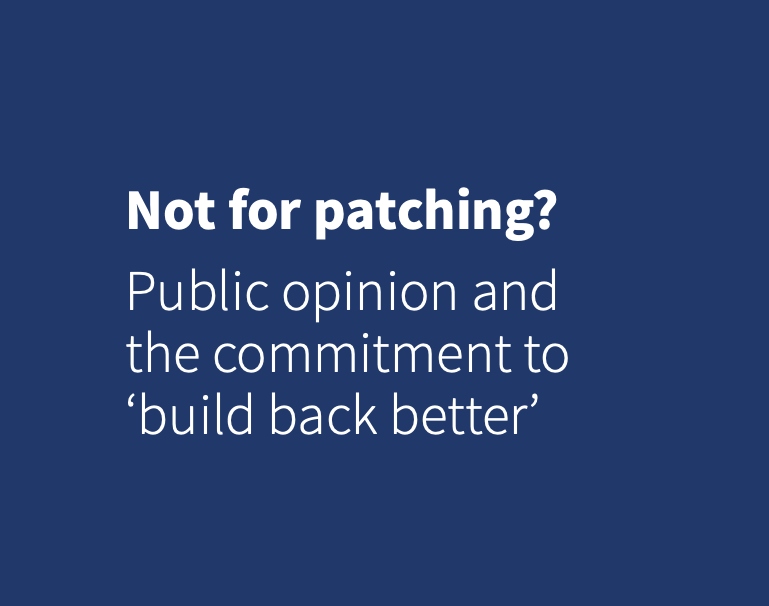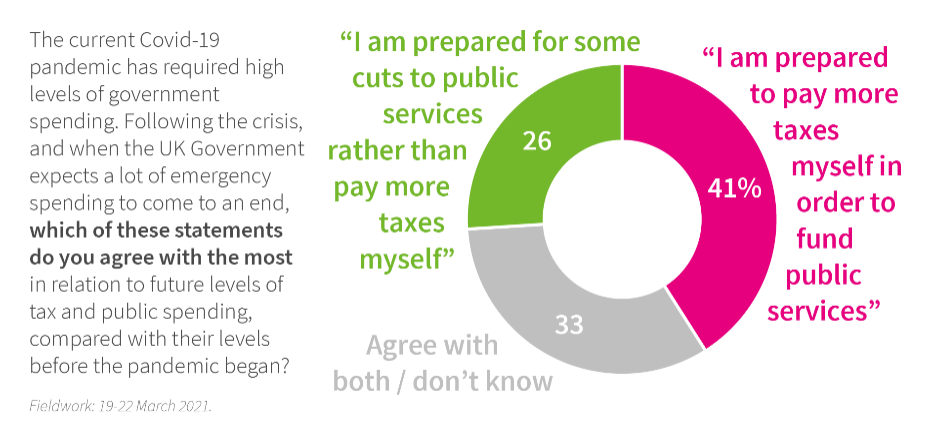Not for Patching? – Dr Patrick Diamond
MEI Director, Dr Patrick Diamond discusses the findings of the report Not for Patching? published by the Mile End Institute at Queen Mary University of London.

Image of the report, Not for Patching? Published by the Mile End Institute.
How far will the Covid-19 pandemic transform the politics of tax and spend in Britain? Earlier in the crisis, there were hints of a political consensus about not ‘going back to business as usual’. But just as in 1945, agreement on the surface masks significant contestation both within and between the major parties about taxation and public spending. Voters may be clear about their priorities, particularly extra funding for the NHS. But delivering that entails choices and trade-offs, particularly in the light of the precarious public finances and potential economic vulnerability in the aftermath of Brexit.
Our research sought to investigate public attitudes to levels of taxation and public spending after the Covid-19 crisis compared to before the crisis. Like the British Social Attitudes survey (BSA), we assume that future governments have a choice between reducing taxes and spending, keeping taxes and spending broadly as they are, or increasing both taxes and spending.
In our survey, only 6% of respondents said that the government should seek to reduce taxes and spending, pursuing a markedly smaller state. However, as the BSA survey confirms, that option has never been particularly popular with the UK electorate. More of our respondents - 42% - favoured increasing taxes and spending, while 32% opted to keep them at a similar level. This finding indicates that the government’s strategy of significantly extending the powers and responsibilities of the state in the light of the pandemic has popular support.
Nonetheless, the BSA surveys that have been conducted since 1983 confirm that public views of taxation and public spending have a cyclical quality. In 2010, for example, after 13 years of Labour governments, 31% of voters favoured increasing spending and taxes, while over half wanted to keep them at the same level. A decade of cuts in public expenditure combined with the solidarity engendered by the pandemic has combined to produce a perceptible shift in the public mood – although it is too soon to determine if this alteration will become permanent. British Social Attitudes draw on comparative political science research to show that the public tends to react ‘thermostatically’ to changes in the level of tax and spending. Over time, sharp rises in spending and taxes will in all likelihood provoke a swing back to greater scepticism about public expenditure and higher taxes.
To better understand the current mood, we reformulated this question focusing on the individual’s personal contribution to the state through taxation. A total of 41% responded – at least hypothetically - that they were prepared to pay more tax to fund public services (see chart 1 below). 26% were prepared to countenance some cuts in public services to avoid paying higher taxes, while 33% didn’t know or wanted a combination of the two. The prevailing mood indicates that the present government is unlikely to face significant political fall-out from the tax rises announced in the 2021 Budget, notably freezing the threshold of the basic and higher rate of income tax.
Tax and Spending Preferences after the Pandemic

Finally, on the issue of taxation, we addressed what respondents thought about how much tax they currently pay: is the present level too high, too low, or about right (see Chart 2)? A majority - 55% - concluded that the amount of tax they pay is at roughly the right level. It is striking that the numbers who believe they currently pay too little tax remain low at 9%. It may well be that 41% are prepared to countenance higher taxes to pay for public services - in the belief that it won’t be them that has to pay.
Amount of Tax Too High/Too Little/About Right

Lord Hennessy, Emeritus Professor of Modern History at QMUL argues powerfully that ‘The Covid-19 experience has sharpened our sense of the duty of care we have one for another, that a state has for all of its people, to a degree we have not felt collectively since World War Two and its aftermath’. Hennessy insists that a powerful ‘never again impulse’ is set to reshape British politics focusing on priorities that mirror Beveridge’s famous 1942 report: tackling the crisis in social care, attending to the shortage of social housing, improving technical education, mitigating the impact of climate change, and preparing our population for the far-reaching effect of Artificial Intelligence (AI).
Our report contains convincing evidence that the public does indeed support a post-pandemic policy consensus that leads to a significant extension in the responsibilities of government. The unprecedented public health emergency and perceived mishandling of the early phase of the pandemic has increased the appetite for a comprehensive solution to the social care crisis while strengthening the protective role of government during periods of economic distress. This shift in the public mood appears to have resonance across the ideological spectrum.
Nevertheless, the public’s view of solidarity and the role of the state in the aftermath of the crisis is not unambiguous. There are limits to how far voters will accept higher spending and taxes, even if they are generally disillusioned with a decade of permanent austerity. They do not believe that the public sector necessarily knows best in the delivery of services. As was the case after 1945, the politics of post-crisis reconstruction in Britain are likely to remain contested. The form of politics that triumphs will be that which is able to frame the public debate and subtly channel the public mood, forging a new social contract around how the state can best ensure prosperity and security for all its citizens.
Dr Patrick Diamond is an Associate Professor of Public Policy at Queen Mary University of London and a former member of the Prime Minister’s Policy Unit (2001-05). He is also Director of the Mile End Institute.
Note on the fieldwork:
Ipsos MORI interviewed 1,120 adults aged 18+ in Great Britain.
Fieldwork was carried out online from 19th March 2021 to 22nd March 2021. Data are weighted to match the profile of the population. All polls are subject to a wide range of potential sources of error.
Note: This article gives the views of the author, and not the position of the Mile End Institute or Queen Mary University of London.